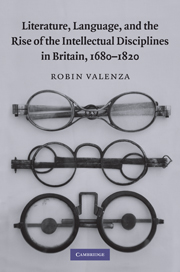Book contents
- Frontmatter
- Contents
- List of Figures
- Acknowledgments
- 1 The Economies of Knowledge
- 2 The Learned and Conversable Worlds
- 3 Physics and its Audiences
- 4 Philosophy's Place Between Science and Literature
- 5 Poetry Among the Intellectual Disciplines
- Coda: Common Sense and Common Language
- Notes
- Works Cited
- Index
2 - The Learned and Conversable Worlds
Published online by Cambridge University Press: 14 December 2009
- Frontmatter
- Contents
- List of Figures
- Acknowledgments
- 1 The Economies of Knowledge
- 2 The Learned and Conversable Worlds
- 3 Physics and its Audiences
- 4 Philosophy's Place Between Science and Literature
- 5 Poetry Among the Intellectual Disciplines
- Coda: Common Sense and Common Language
- Notes
- Works Cited
- Index
Summary
They that content themselves with general ideas may rest in general terms; but those whose studies or employments force … closer inspection must have names for particular parts, and words by which they may express various modes of combination, such as none but themselves have occasion to consider.
– Samuel Johnson, Idler 70 (1759)“Every author does not write for every reader,” Samuel Johnson noted in his 1759 essay on “hard words.” Johnson's pronouncement has the air of a commonplace, presenting the obvious as self-evidently true. But its settled tone belies how polemical a statement this was. Johnson's essay stakes out his position in the eighteenth-century debate about the politics of writing in the English language. The controversy revolved around the much disputed question of whether or not there should be a single, shared English language, accessible to all readers and fixed in its vocabulary and usage.
There were those who endorsed the view that any writing should be intelligible to all broadly educated readers of English, regardless of the topic addressed. This eminently democratic position was often advocated by early eighteenth-century essayists, such as Richard Steele, who enjoined youthful literati to heed Aristotle's advice: “Think with the wise, but talk with the vulgar.” Johnson disagreed with Steele and his early-century compatriots, arguing instead that even the most cursory glance at the communicative requirements of a particular science or a trade reveals the necessity of its maintaining its “peculiar language ” in contradistinction to the corrupted and capricious vocabulary of common life.
- Type
- Chapter
- Information
- Literature, Language, and the Rise of the Intellectual Disciplines in Britain, 1680–1820 , pp. 37 - 53Publisher: Cambridge University PressPrint publication year: 2009



